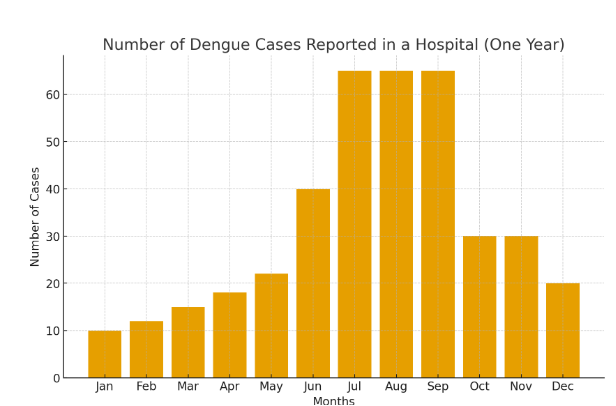NCERT Solutions for Class 8 Science Curiosity Chapter 3 Health: The Ultimate Treasure provide clear explanations and step-by-step answers to all exercises in the textbook. This chapter helps students understand the meaning of health, difference between communicable and non-communicable diseases, symptoms, causes and preventive measures. It also explains immunity, vaccination, healthy lifestyle practices and the importance of community hygiene. These solutions guide learners in writing accurate exam answers while developing awareness about maintaining overall health and well-being.
Class 8 Science Curiosity Chapter 3 MCQ
Class 8 Science Old Book Chapter 3 MCQ
Class 8 Science Old Book Chapter 3 Solutions
Health: The Ultimate Treasure Class 8 Science Curiosity Chapter 3 Answers
1. Group the diseases shown in the images as communicable or non-communicable.

See AnswerCommunicable diseases (spread from one person to another):
1. Cold and flu
2. Typhoid
3. Chickenpox
Non-communicable diseases (do not spread, caused by lifestyle, environment or body conditions):
1. Diabetes
2. Asthma
So, 3 are communicable and 2 are non-communicable.
2. Diseases can be broadly grouped into communicable and non-communicable diseases. From the options given below, identify the non-communicable diseases.
(i) Typhoid (ii) Asthma (iii) Diabetes (iv) Measles
(a) (i) and (ii) (b) (ii) and (iii) (c) (i) and (iv) (d) (ii) and (iv)
See AnswerCorrect answer (b) (ii) and (iii)
Because:
Typhoid → Communicable (caused by bacteria, spreads through contaminated food/water)
Asthma → Non-communicable (related to allergy/respiratory issues, not spread)
Diabetes → Non-communicable (lifestyle/metabolic disease, not spread)
Measles → Communicable (caused by a virus, spreads through air/droplets)
3. There is a flu outbreak in your school. Several classmates are absent, while some are still coming to school coughing and sneezing.
(i) What immediate actions should the school take to prevent further spread?
See AnswerImmediate actions by the school:
• Tell sick students to stay at home and take rest.
• Teachers can remind everyone to cover their mouth and nose while coughing or sneezing.
• Provide hand sanitizers/soap and ensure students wash hands often.
• Keep classrooms clean and well-ventilated.
• Inform parents about the outbreak and ask for cooperation.
(ii) If your classmate, who shares the bench with you, starts showing symptoms of the flu, how can you respond in a considerate way without being rude or hurtful?
See AnswerMy response to a bench partner with flu symptoms:
• I will not laugh or make rude comments.
• I can politely say: “You don’t look well, maybe you should tell the teacher and take some rest.”
• I can offer them a tissue or remind them gently to cover their mouth while coughing.
• This way I show care and concern without hurting their feelings.
(iii) How can you protect yourself and others from getting infected in this situation?
See AnswerProtecting myself and others:
• Wash my hands with soap or sanitizer after touching surfaces.
• Wear a mask in class to reduce risk.
• Avoid touching my eyes, nose or mouth unnecessarily.
• Keep a little distance from those coughing/sneezing but politely.
• Drink warm water, eat healthy food and take proper rest to keep immunity strong.
8th Science Curiosity Chapter 3 Question 4 and 5
4. Your family is planning to travel to another city where malaria is prevalent.
(i) What precautions should you take before, during, and after the trip?
See AnswerPrecautions before, during and after the trip:
• Before the trip: Take advice from a doctor, carry mosquito nets, repellents, and full-sleeved clothes.
• During the trip: Use mosquito nets at night, apply repellents on exposed skin, avoid water collection near stay place, and wear full sleeves.
• After the trip: Watch for fever, chills or body ache. If symptoms appear, visit a doctor immediately for a blood test.
(ii) How can you explain the importance of mosquito nets or repellents to your sibling?
See AnswerExplaining to my sibling about mosquito nets/repellents:
I will say: “Mosquitoes spread malaria when they bite. If we sleep without a net, they can easily bite us. Nets and repellents act like a shield — they stop mosquitoes from coming near us. It’s like wearing armor to protect ourselves from an enemy.”
(iii) What could happen if travellers ignore health advisories in such areas?
See AnswerIf travellers ignore advisories:
• They may get malaria infection with fever, chills and weakness.
• It can make the trip unpleasant and may require hospitalization.
• Travellers can also carry the infection back home, increasing the risk for others.
5. Your uncle has started smoking just to fit in with his friends, even though it is well known that smoking can seriously harm health and even cause death.
(i) What would you say to him to make him stop, without being rude?
See AnswerI would talk politely and say:
“Uncle, I really care for you. Smoking may look ‘cool’, but it can damage your lungs, cause cancer and even shorten life. You’re strong enough to say no to such pressure. Your friends will respect you more if you choose health over smoking.”
(ii) What would you do if your friend offers you a cigarette at a party?
See AnswerIf a friend offers me a cigarette at a party:
• I will say a firm but polite “No, thanks.”
• I can add: “I don’t want to spoil my health. Let’s enjoy the party in a better way.”
• If they insist, I will walk away and not feel bad, because real friends won’t force harmful things.
(iii) How can schools help prevent students from indulging in such harmful habits?
See Answer• Organize awareness campaigns on the dangers of smoking, alcohol and drugs.
• Invite doctors or counsellors to give talks.
• Show short films, posters and street plays about the harmful effects.
• Encourage healthy activities like sports, yoga and debates so students build confidence and don’t give in to peer pressure.
Class 8 Science Curiosity 3 Question 6 and 7
6. Saniya claims to her friend Vinita that “Antibiotics can cure any infection, so we don’t need to worry about diseases.” What question(s) can Vinita ask her to help Saniya understand that her statement is incorrect?
See Answer• Do antibiotics work against viruses like flu, cold or measles?
• If antibiotics cured every disease, then why do we still need vaccines?
• Why do doctors say not to take antibiotics for coughs and colds?
• Have you heard about antibiotic resistance — when germs stop responding to medicines?
These questions will make Saniya think and understand that antibiotics only work against bacterial infections, not viral or other diseases.
7. The following table contains information about the number of dengue cases reported in a hospital over a period of one year:

Make a bar graph of the number of cases on the Y-axis and the month on the X-axis. Critically analyse your findings and answer the following:

(i) In which three months were the dengue cases highest?
See AnswerJuly, August, September (65 cases each).
(ii) In which month(s) were the cases lowest?
See AnswerJanuary (10 cases).
(iii) What natural or environmental factors during the peak months might contribute to the increase in dengue cases?
See AnswerNatural/environmental factors during peak months:
• These months fall in the monsoon season.
• Rainwater often collects in puddles, tanks or containers.
• Stagnant water becomes a breeding ground for mosquitoes (Aedes aegypti), which spread dengue.
(iv) Suggest a few preventive steps that the community or government can take before the peak season to reduce the spread of dengue.
See AnswerPreventive steps before peak season:
• Clean and cover water tanks; don’t let water stagnate.
• Regular fogging and spraying of insecticides by authorities.
• Encourage people to use mosquito nets and repellents.
• Awareness campaigns in schools, colonies and markets.
• Community cleanliness drives to remove tyres, bottles or open containers where water can collect.
Class 8 Curiosity Chapter 3 Question 8 and 9
8. Imagine you are in charge of a school health campaign. What key messages would you use to reduce communicable and non-communicable diseases?
See AnswerFor Communicable Diseases:
• Wash hands with soap regularly.
• Always cover your mouth and nose while coughing or sneezing.
• Drink only clean and safe water.
• Keep classrooms and surroundings clean to avoid mosquito breeding.
• Get vaccinated on time.
• Stay home and rest if you are sick to prevent spreading infections.
For Non-Communicable Diseases:
• Eat a balanced diet with fruits, vegetables and less junk food.
• Exercise, play outdoor games or do yoga every day.
• Limit screen time and get enough sleep.
• Avoid harmful habits like smoking, alcohol or drugs.
• Manage stress with relaxation, hobbies and talking to family or friends.
Slogan idea for the campaign:
“Healthy Habits Today, Strong Future Tomorrow!”
9. It is recommended that we should not take an antibiotic for a viral infection like a cold, a cough or flu. Can you provide the possible reason for this recommendation?
See Answer• Antibiotics work only against bacteria. They kill or stop the growth of bacterial cells.
• Colds, coughs, and flu are caused by viruses, not bacteria. Antibiotics cannot kill viruses.
• If we use antibiotics wrongly for viral infections, the bacteria in our body may become resistant. This is called antibiotic resistance. Later, when we actually need antibiotics for a serious bacterial infection, the medicines may not work.
That’s why doctors say: Don’t take antibiotics for viral infections. Take them only when prescribed.
Class 8 Science Chapter 3 Question 10 and 11
10. Which disease(s) among the following may spread if drinking water gets contaminated by the excreta from an infected person?
Hepatitis A, Tuberculosis, Poliomyelitis, Cholera, Chickenpox.
See AnswerHepatitis A → spreads through contaminated food and water
Poliomyelitis (Polio) → spreads through water/food contaminated with faeces
Cholera → spreads through contaminated water and food.
11. When our body encounters a pathogen for the first time, the immune response is generally low but on exposure to the same pathogen again, the immune response by the body is much more compared to the first exposure. Why is it so?
See AnswerWhen our body meets a pathogen for the first time, the immune system is not familiar with it. It takes time to recognize the germ and make specific antibodies. That’s why the first response is slow and weak.
But after the first attack, our body makes memory cells. These cells “remember” the pathogen. So, when the same pathogen enters again, the body quickly produces lots of antibodies and destroys it much faster.
This is why vaccines work too — they prepare our body’s memory cells in advance.


